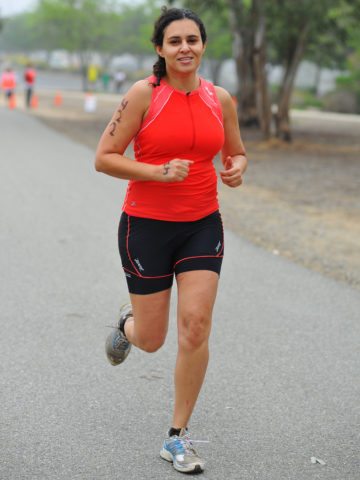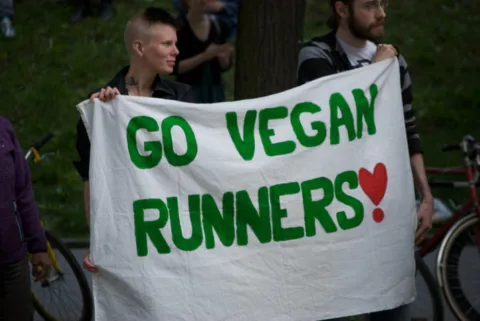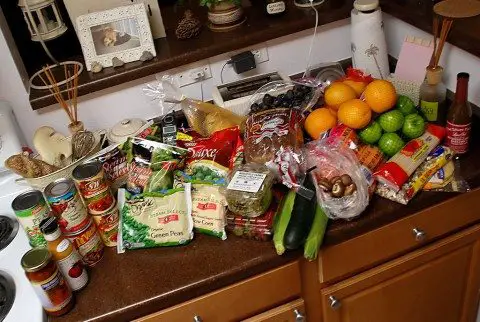Let’s define our terms here:
- Vegetarians do not eat any animals. This includes pigs, chickens, cows, sea animals, and every other animal.
- In addition to not consuming any animal flesh, vegans also don’t eat dairy products, eggs, or any other product derived from an animal.
There are many different reasons that motivate people to be vegan. Preventing the exploitation of animals is not the only reason for becoming vegan. More and more people are turning to a vegan diet for the health benefits.
And yet you may have heard that a person can’t be an endurance athlete and be vegan due to the difficulty of maintaining an adequate consumption of protein — which is associated with meat, eggs, and dairy products.
Let’s sort this out…
Vegan Athletes
Firstly, there are many successful athletes who are vegan.
Scott Jurek, arguably the most successful ultra runner of our generation is vegan and wrote a book about it.
There are other vegan ultra runners and triathletes that you can learn more about, if you’re interested.
7 Sources Of Protein For Vegans
There are at least 7 vegan sources of protein one can work into their daily nutrition plan:
#1 Vegetables – the proper foundation for all diets.
- 1 avocado – 10 grams
- 1 cup broccoli – 5 grams
- 1 cup spinach – 5 grams
- 2 cups cooked kale – 5 grams
- 1 cup boiled peas – 9 grams
- 1 cup cooked sweet potato – 5 grams
#2 Legumes – while also vegetables, they get their own mention. Specifically lentils and beans, the foundation of many diets for centuries.
- 1 cup soybeans – 28 grams (1 cup tofu – 22 grams, 1 cup tempeh – 30 grams)
- 1 cup lentils – 18 grams
- 1 cup refried beans – 15.5 grams
- 1 cup garbanzo beans (and hummus) – 14.5 grams
- 1 cup pinto, kidney, black beans – 13 to 15 grams
- 1 oz. peanuts – 6.5 grams
#3 Nuts and seeds – a staple in most vegetarian and vegan diets.
- 1 oz. cashews – 4.4 grams
- 1 oz. sesame seeds – 6.5 grams (3 tbsp tahini – 8 grams)
- 1/4 cup walnuts – 5 grams
- 1 oz. pistachios – 5.8 grams
- 2 tbsp almonds – 4 grams
- 2 tbsp nut butters (peanut butter, almond butter, cashew butter) – 8 grams
#4 Non-dairy milk – a balanced vegan diet can be high in calcium even without dairy products.
- 1 cup soy milk, almond milk, ancient grain milk – 7 to 9 grams
#5 Grains – ancient grains, sprouted grains and multi-grains are a major part of a vegan diet.
- Quinoa is versatile and delicious. 1 cup – 9 grams
- Amaranth, bulgur, brown rice, wheat germ, oat bran are other grains with a high protein content.
- Seitan (flavored wheat gluten) has about 52 grams per cup, but it may not be a good idea to eat a lot of it.
- Oatmeal is a popular staple. 1 cup – 6 grams
- Sprouted grain bread products (buns, tortillas, bread). Make a sandwich or a wrap and you’ll get 7 to 10 grams from the bread alone.
#6 Convenience foods – tasty snacks are also a necessity.
- There are vegan protein powders and vegan protein bars to fill in the gaps on the go.
- Hemp – 30 grams of hemp powder in your smoothie gives you 11 grams of protein.
- Or, make your own high-energy plant-based snacks.
#7 Supplements – in addition to vitamin B12, some vegans take other supplements as well.
- Spirulina and chlorella are used often by vegetarians and vegans for their rich nutrient content and protein content.
- Here are some recommended supplements for vegans.
A few additional resources to check out on this subject of vegan proteins include:
- 10 Vegan Sources Of Protein
- Protein In The Vegan Diet
- Your Vegan Guide To Foods With Protein
- How I Maintain A Low Budget Eating Vegan
My Advice For Vegan Athletes
 I am myself a vegan. For a period of time I was vegetarian and then made the transition to vegan.
I am myself a vegan. For a period of time I was vegetarian and then made the transition to vegan.
A few of the challenges for me initially was not using creamer for my coffee and honey as a sweetener. But over time I discovered great vegan alternatives for all those things I missed at first.
It’s the wrong mindset to think of veganism as all the things you have to give up. What I discovered instead is that I was opening up a door to a whole new world of wonderful eating, food and nutrition.
There are plenty of great vegan cookbooks to use, and I found a few awesome vegan restaurants in the city where I live.
Here are a few final pointers to consider as you explore the vegan path:
- Educate yourself. Don’t rush into becoming vegan. Take some time to learn more about what it means to be vegan. For most people it’s more than simply changing your diet, but a whole new lifestyle and way of being in the world.
- Be patient. Becoming a vegan is a transition that is different for every person. Don’t condemn yourself if you don’t make the transition perfectly or completely all at once. It’s a big change in your life. Be kind to yourself.
- Don’t become a vegan fundamentalist. It’s only natural that a person will become passionate about the benefits of being vegan and want to share that with others. Just be careful of banging people over the head with your vegan club. Some vegans turn people off by being so militant about it. I would recommend a kinder and gentler approach that focuses on educating people on the benefits of being vegan.
If you’re interested in a simple transition plan to veganism, here are a few options to consider:





